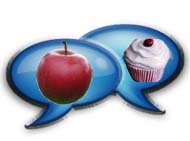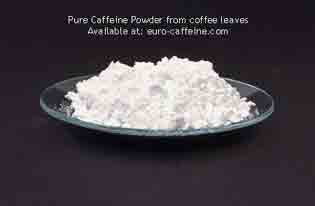|
Effects of CaffeineHow Caffeine Can Effect You and
|
| Drink/Food/Supplement |
Amt.Drink/Food (mg) |
Amt.Caffein (mg) |
| Red Bull energy drink |
8.3 ounces |
80 mg |
| Mountain Dew |
12 ounces |
150 mg |
| Coca Cola |
12 ounces |
34 mg |
| Diet Coke |
12 ounces |
45 mg |
Pepsi |
12 ounces |
28 mg |
|
| Seven Up |
12 ounzes |
0 mg |
| Brewed Coffee Drip Method |
5 onces |
115 mg |
| Iced Tea |
12 onzes |
70 mg |
| Chocolate Milk Beverage |
8 ounces mg |
115 mg |
| Dark Chocolate |
1 ounze |
20 mg |
| Milk Chocolate |
1 ounce |
6 mg |
| Extradin Extra Strenght |
2 tablets |
130 mg |
*denotes average amount
(Source: U.S. Food and Drug Administration, National Soft Drink Association, Center for Science in the Public Interest)
Image: http://www.euro-caffeine.com)
Tolerance, Depedence and Withdrawal
Becoming dependent or addicted is relatively easy: by consuming 100 mg on a daily basis. This can lead to any of the withdrawal symptoms listed above.
Regular caffeine consumption reduces sensitivity to caffeine. When caffeine intake is reduced, their can be a resulting drop in blood pressure leading to headache. This headache can lasts from for up to five days, and can be alleviated with analgesics such as aspirin or paracetamol or by drinking more coffee.
The most commonly reported effects of caffeine withdrawal also include fatigue and general lethargy, sleepiness, difficulty in concentration, irritability, anxiety, depression, flu-like symptoms such as nausea, vomiting, pains and stiffness in the muscles and chills and problems with vigilance and cognitive performance.
Cutting Out Caffeine
While it is better not to drink too much caffeine to begin with, but if you have developed a dependence on caffeine and wish to cut down or stop your intake entirely it is better to do so gradually. This will minimize the effects of caffeine withdrwal and make the caffeine withdrawal headaches and other side effects more bearable.
If you want to drink coffee, tea, or soda, it is almost always possible to find a caffeine-free or decaffeinated version. Go instead for plain water, weak green tea or diluted fruit juice. Another substitute can be chilled gazpacho, a cold soup popular in Spain, that can help you get your five a day as well as reduce caffeine intake. Replace your caffeinated beverages slowly with more and more non-caffeinated ones. Gradually replace your regular coffee with decaffeinated variety. Doing this slowly but surely should help you endure the effects of caffeine withdrawal more easily. Treat the withdrawal headaches with pain killers and drink lots of water to flush the caffeine from your body.
It is unusual to have extremely severe withdrawal symptoms but occasionally withdrawing from considerable caffeine dependence has been known to produce significant distress or impairment in daily functioning, but such extreme reactions can be avoided by gradual withdrawal. It is usually fairly simple to come off caffeine if it is done gradually and perfectly safe to do so. However, if sever withdrawal symptoms occur or if you are not sure if these are due to caffeine withdrawal or something else, consult your family doctor or other health care professional.
References: Caffeine and Health. J. E. James, Academic Press, 1991. Progress in Clinical and Biological Research Volume 158. G. A. Spiller, Ed. Alan R. Liss Inc, 1984.
Here are some books and other products about caffeine and how to beat the addiction to caffeine.
age-well.org > eat well > effects of caffeine
TOP of Effects of Caffeine
BACK to age-well.org
Translate this Page
Search this Site
| search engine by freefind | advanced |


Different Diets
|
Eat Well |
The DASH Diet |
DASH Food Pyramid |
DASH Mealplan |
Raw Food Diet |
Natural Remedies
|
Natural Remedies
|
Superfoods
|
Juicing
|
Eat Well Forum
|
Eat-well Forum

Different Nutrients
|
Antioxidants |
|
Water |
|
Caffeine
|
|
Chocolate
|
|
Cherries |
|
Cranberries
|
|
Maquiberries
|
|
Salt |
|
Sugar |
Cholesterol
|
|
Fruit and Vegetables
|
|
Nuts, Beans, Pulses
|
|
Monosodium Glutamate
|
|
Transfats
|
A - Z Vitamins
and Minerals
|
Vitamins & Minerals
|
|
Water-soluble Vitamins
|
|
Fat-soluble Vitamins
|
|
Macro Minerals
|
|
Micro-minerals
|







